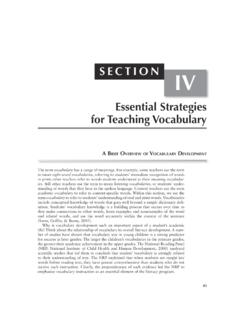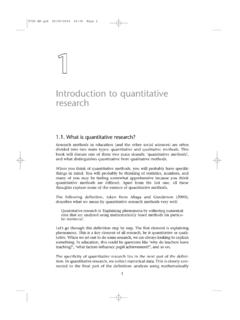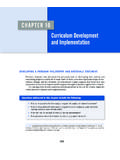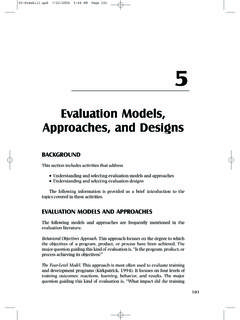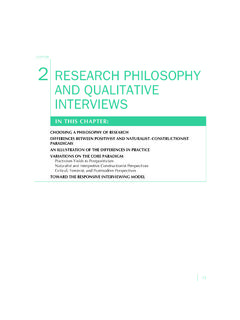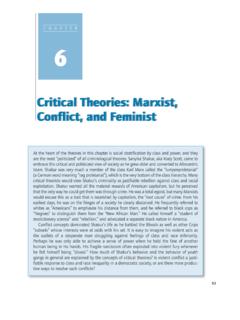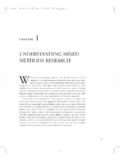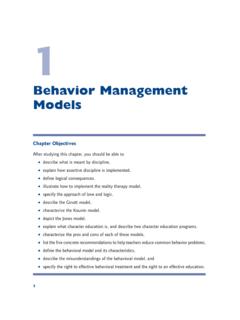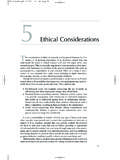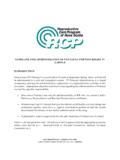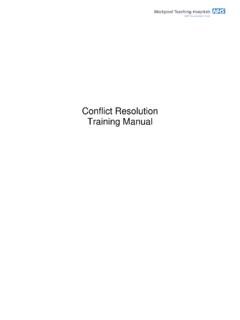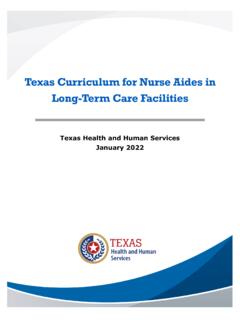Transcription of What is Action Research? - SAGE Publications Inc
1 1 What is Action Research? This chapter focuses on: What Action research is The purposes of conducting Action research The development of Action research What is involved in Action research The models and definitions of Action research The key characteristics of Action research The philosophical worldview of the Action researcher Examples of Action research research which is also known as Participatory Action research (PAR), community-based study, co-operative enquiry, Action science and Action learning is an approach commonly used for improving conditions and practices in a range healthcare environments (Lingard et al.)
2 , 2008; Whitehead et al., 2003). It involves healthcare practitioners conducting systematic enquiries in order to help them improve their own practices, which in turn can enhance their working environment and the working environments of those who are part of it clients, patients, and users. The purpose of undertaking Action research is to bring about change in specific contexts, as Parkin (2009) describes it. Through their observations and communications with other people, healthcare workers are continually making informal evaluations and judgements about what it is they do.
3 The difference between this and carrying out an Action research project is that during the process researchers will need to develop and use a range of skills 01-Koshy et 103/09/2010 5:08:45 PMA C T I O N R E S E A R C H I N H E A L T H C A R E2to achieve their aims, such as careful planning, sharpened observation and listening, evaluation, and critical reflection. Meyer (2000) maintains that Action research s strength lies in its focus on generating solutions to practical problems and its ability to empower prac-titioners, by getting them to engage with research and the subsequent development or implementation activities.
4 Meyer states that practitioners can choose to research their own practice or an outside researcher can be engaged to help to identify any problems, seek and implement practical solutions, and systematically monitor and reflect on the process and out-comes of change. Whitehead et al. (2003) point out that the place of Action research in health promotion programmes is an important and yet rela-tively unacknowledged and understated activity and suggest that this state of affairs denies many health promotion researchers a valuable resource for managing effective changes in of the reported Action research studies in healthcare will have been carried out in collaborative teams.
5 The community of enquiry may have consisted of members within a general practice or hospital ward, general practitioners working with medical school tutors, or members within a healthcare clinic. The users of healthcare services can often be included in an Action research study; as such they are not researched on as is the case in much of traditional research . This may also involve several healthcare practitioners working together within a geographical area. Multidisciplinary teams can often be involved (for example, medical workers working with social work teams).
6 Action research projects may also be initiated and carried out by members of one or two institutions and quite often an external facilitator (from a local university, for example) may be included. All the participating researchers will ideally have to be involved in the process of data collection, data analysis, planning and implementing Action , and validating evidence and critical reflection, before applying the findings to improve their own practice or the effectiveness of the system within which they of conducting Action researchIn the context of this book, we can say that Action research supports prac-titioners in seeking out ways in which they can provide an enhanced qual-ity of healthcare.
7 With this purpose in mind, the following features of the Action research approach are worthy of consideration (Koshy, 2010: 1): Action research is a method used for improving practice. It involves Action , evaluation, and critical reflection and based on the evidence gathered changes in practice are then et 203/09/2010 5:08:45 PMW H A T I S A C T I O N R E S E A R C H ?3 Action research is participative and collaborative; it is undertaken by individuals with a common purpose. It is situation-based and context specific.
8 It develops reflection based on interpretations made by the participants. Knowledge is created through Action and at the point of application. Action research can involve problem solving, if the solution to the problem leads to the improvement of practice. In Action research findings will emerge as Action develops, but these are not conclusive or absolute. Later in this chapter we shall explore the various definitions of Action research . Hughes (2008) presents a convincing argument for carrying out Action research in healthcare settings.
9 Quoting the declaration of the World Health Organization (1946) that health is a state of complete physical, mental and social well being and not merely the absence of disease or infirmity , Hughes stresses that our health as individuals and communities depends on environmental factors, the quality of our relationships, and our beliefs and attitudes as well as bio-medical factors, and therefore in order to understand our health we must see ourselves as inter-dependent with human and non-human elements in the system we participate in.
10 Hughes adds that the holistic way of understanding health, by looking at the whole person in context, is congruent with the participative paradigm of Action research . The following extract coming from an Action researcher (included by Reason and Bradbury in the introduction to their handbook of Action research ) sums up the key notion of Action research being a useful approach for healthcare professionals:For me it is really a quest for life, to understand life and to create what I call living knowledge knowledge which is valid for the people with whom I work and for myself.

